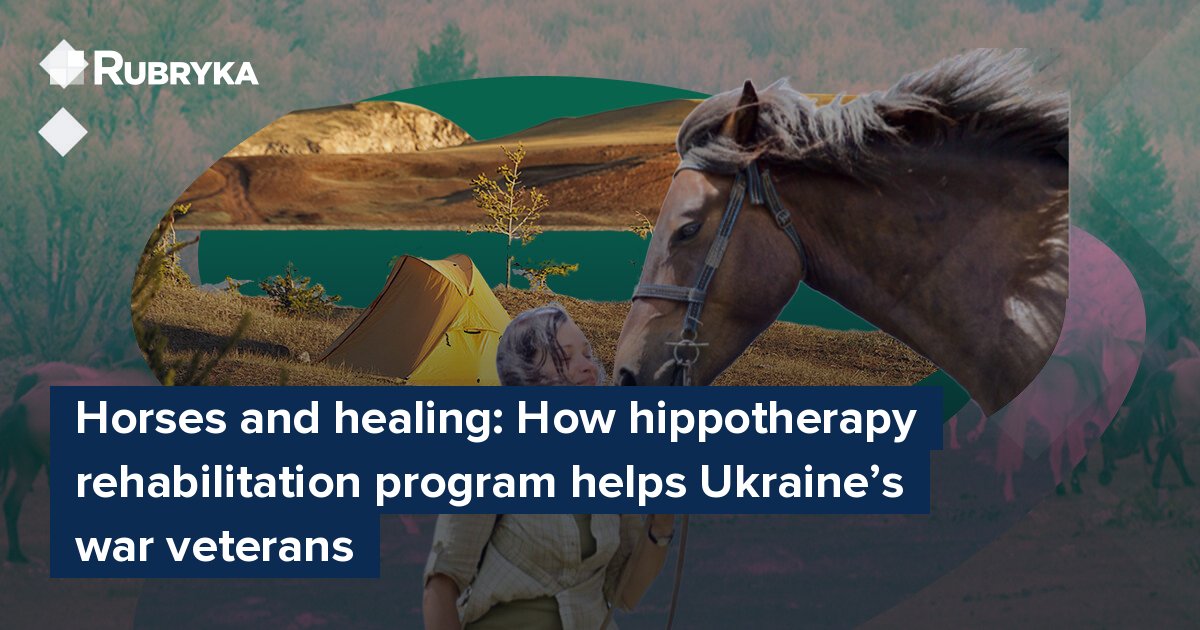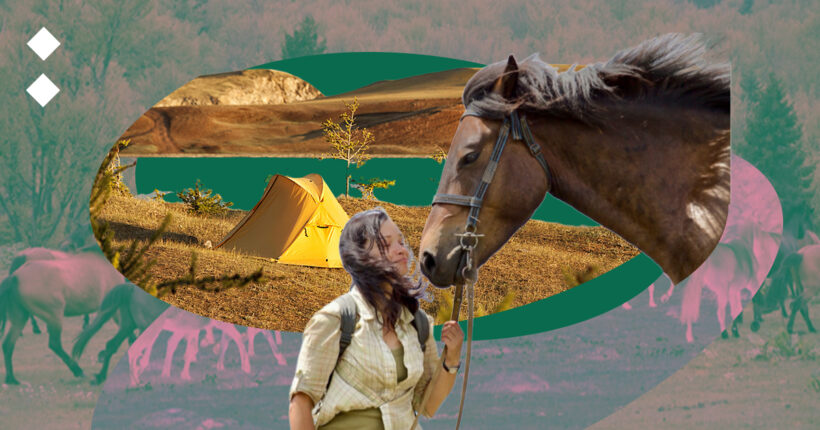
What's the problem?
War leaves deep scars not only on the body but also on the minds of those who have been in combat. When Russia started its first invasion of Ukraine in 2014 and the full-scale war in 2022, many Ukrainians took up arms to defend their country and people.
Returning from the front line, Ukrainian soldiers often deal with PTSD, emotional and psychological trauma, moral exhaustion, and difficulties adjusting to society. Physical injuries and limitations add even more challenges to the daily lives of military personnel and veterans.
What's the solution?
Rehabilitation and psychological support are crucial for veterans to reintegrate into a peaceful life. One effective method used worldwide, including in Ukraine, is equine-assisted therapy or hippotherapy.
Psychologists say that even a few hours of contact with horses can improve a person's emotional state, helping them refocus, ground themselves, and feel present. Physical exercises done by soldiers while horseback riding on specially chosen horses improve balance, motor skills, and coordination. In one form of equine therapy, a person doesn't touch the horse but connects with the animal emotionally, which also calms the patient's nervous system.
Recently, many riding clubs in Ukraine have started offering this rehabilitation method for service members and veterans of the Russian-Ukrainian war. One such club is EquitoursUA (NGO Equine World), located high in the Carpathian Mountains and specializing in equine tourism for over 20 years.
The club's Horses and Heroes project offers a unique approach to rehabilitation through interaction with horses. Here, the horse is not just a tool but a partner and even a teacher, helping veterans overcome the effects of war, restore their mental health, and find the inner strength to return to normal life.
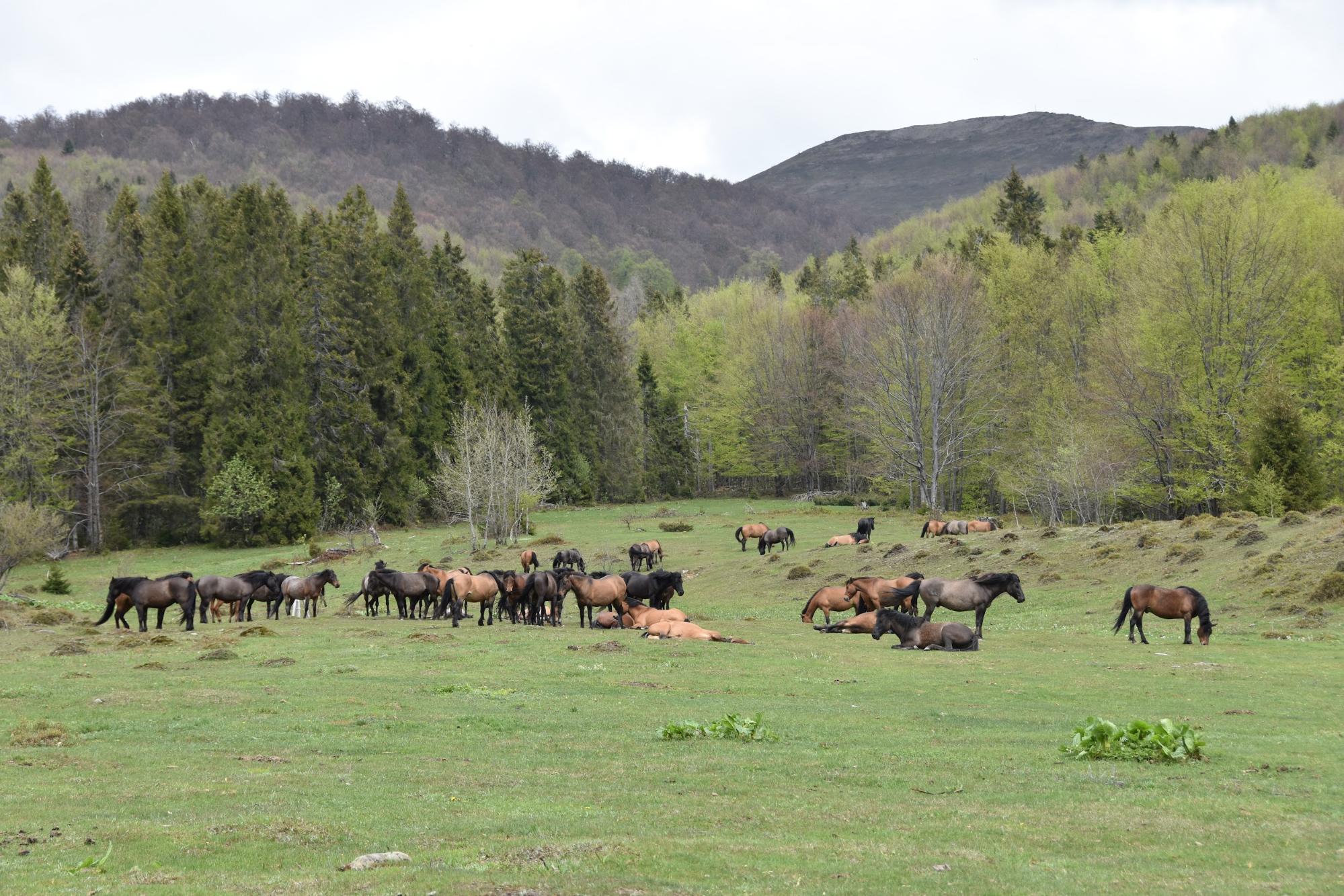
A herd of over 80 horses grazes freely in the Carpathian meadows. Photo from the project's archive
This unique initiative offers those recovering from injuries not just a horse ride but a whole week in a calm and safe natural environment.
The program is free for active military personnel and veterans of the Russian-Ukrainian war, including combatants and those disabled by war, such as from explosive injuries or amputations. However, due to the club's location, the project's team stresses that participants must be able to move and care for themselves independently.
How does it work?
"Doctors treat diseases, but nature heals"
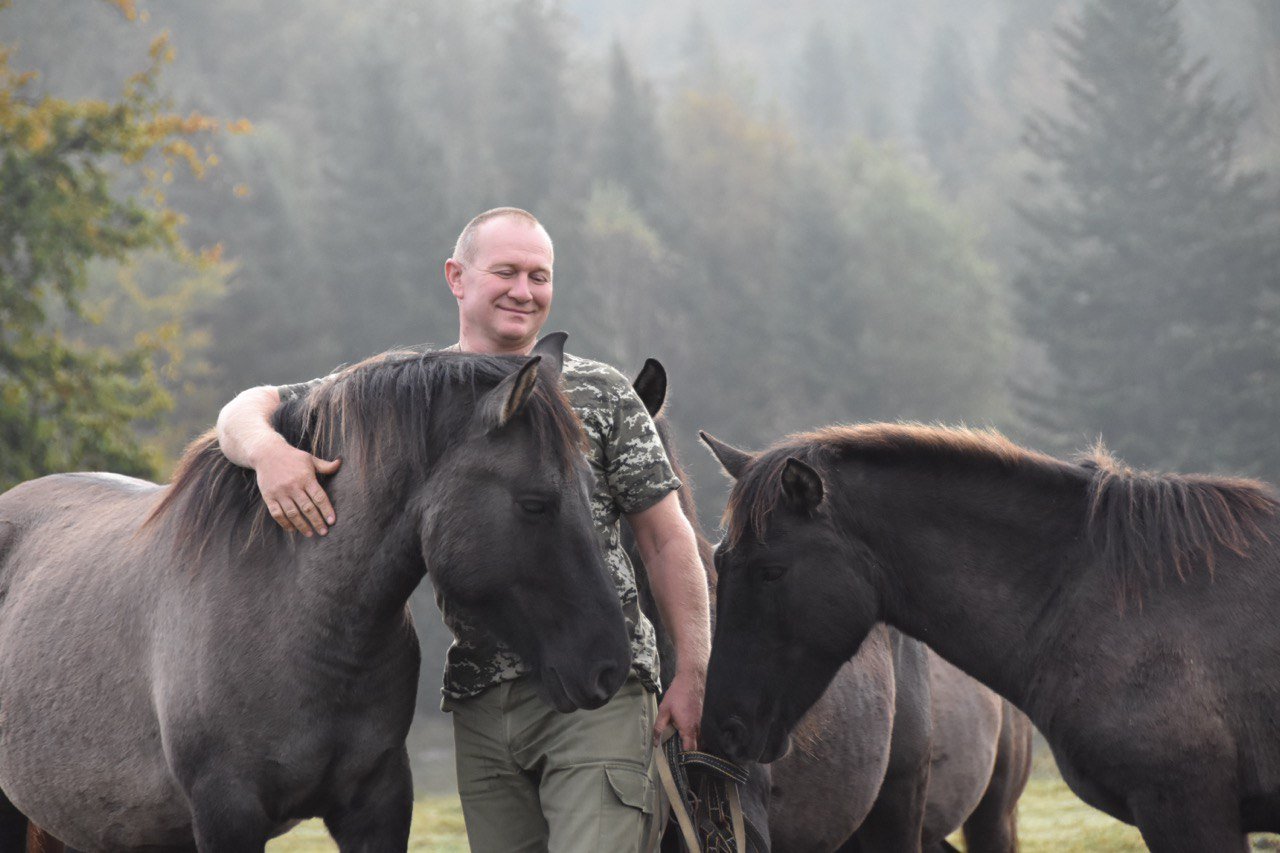
Oleksandr Ihnatenko, the project's co-founder, with horses. Photo from the project's archive
Oleksandr Ihnatenko, a breeder, veterinarian, and certified equine therapist, who owns a herd of Hutsul breed horses, and Yulia Komarova, an Oriental studies expert and teacher, initiated the Horses and Heroes project. Oleksandr and Yulia met after she moved from the eastern city of Donetsk to the western city of Lviv in late 2013 to try out another way of life. She planned to stay for six months, but after the Russian occupation of her hometown in 2014, she couldn't return. She began horseback riding in Lviv, met Oleksandr and his horses, and eventually joined his work. Since 2016, the pair has been developing the Mountain Horse Tourism School, working with the herd and horses, and organizing rehabilitation events for military personnel and veterans.
"The program we invite people to is 'doctors treat, nature heals.' It's based on observing horses, other animals, birds, and the sounds of nature, which change with each season," says Oleksander Ihnatenko. "In this vast sea of nature, which in some ways is a 'terra incognita' for us, the herd of horses becomes familiar and reliable. The horses live and graze on this land, which becomes your home during your stay."
Oleksandr explains that when a person comes to stay in the club, they unknowingly begin their rehabilitation by cooperating with the horses from afar to comfortably coexist with the animals.
"This is equine therapy. It's about working with horses in a way that doesn't harm them and benefits people," says Oleksandr.
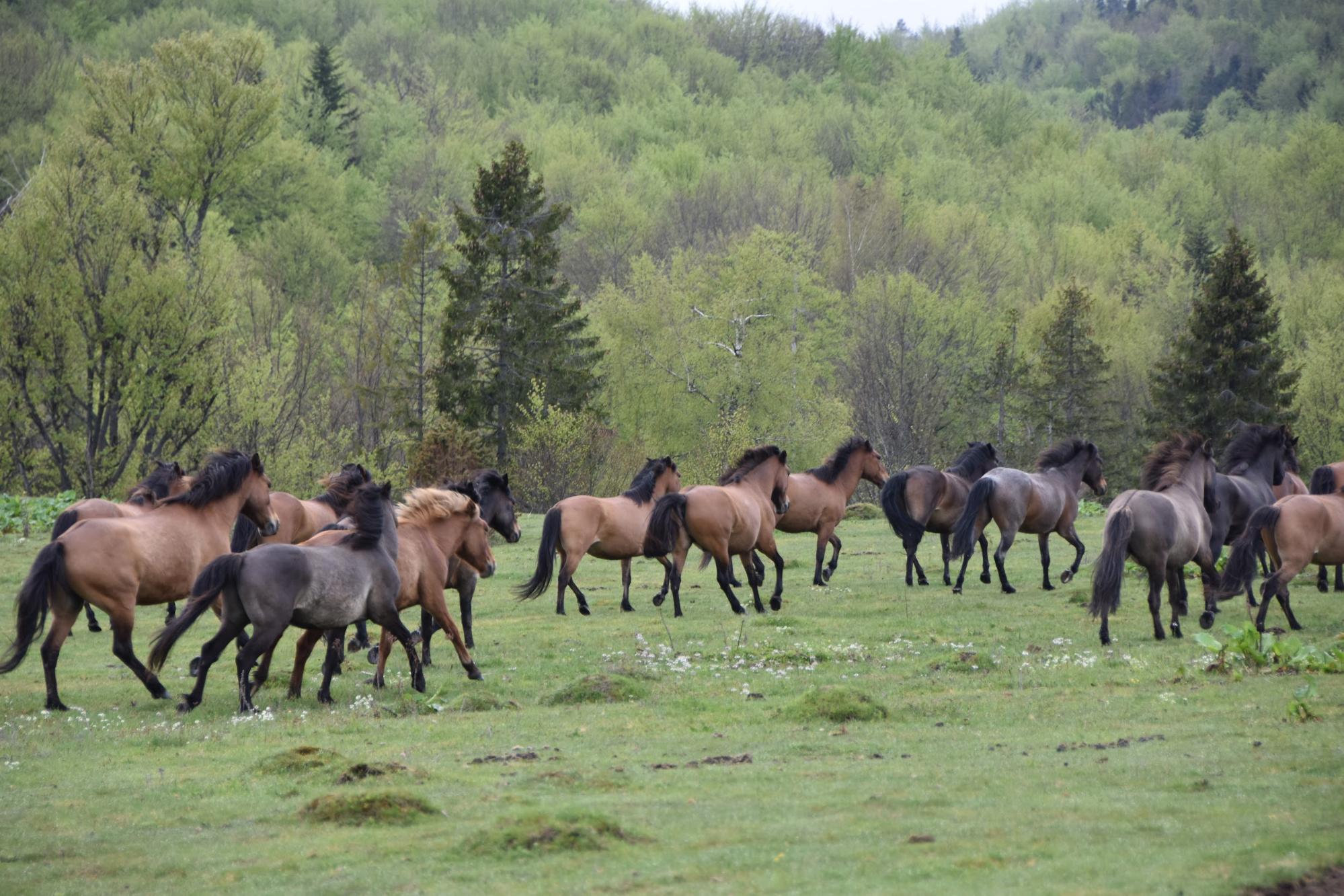
The main goal of Oleksandr's Polonynske Farm is to preserve the Hutsul breed of horses in their natural habitat. Photo from the project's archive
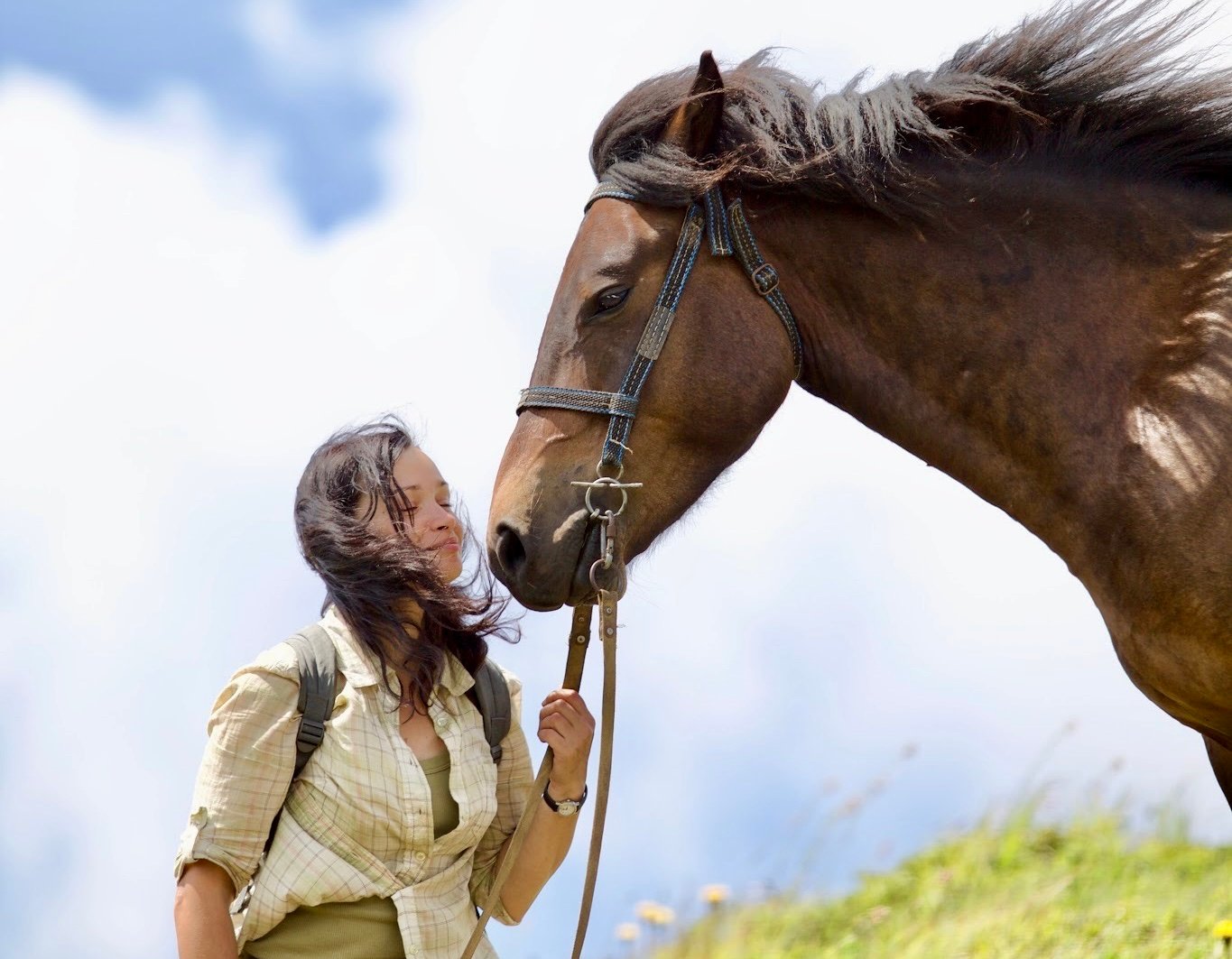
Yulia Komarova is holding a horse. Photo from the project's archive
Project co-founder Oleksandr Ihnatenko says the Horses and Heroes program idea took time. It was adapted from the Mountain Horse Tourism School programs the club has been doing for over five years.
"Since we work with a herd of horses in natural conditions, our collaboration with horses has three equally important parts: working with horses from a distance, working with horses from the ground, and working with horses while riding," says Oleksandr. "Cooperation from a distance is very delicate. Our school's program has an event called 'Horse Guests Camp,' where participants observe the herd without riding and learn more about horses. This program became the foundation for the first 'Horses and Heroes' program. In the fall of 2023, we realized what we could offer to our soldiers."
The partners Yulia and Oleksandr started working in a new direction and created the rehabilitation program for veterans over the winter, anticipating the 2024 season.
A horse as a teacher, a person as a student. What does the project offer?
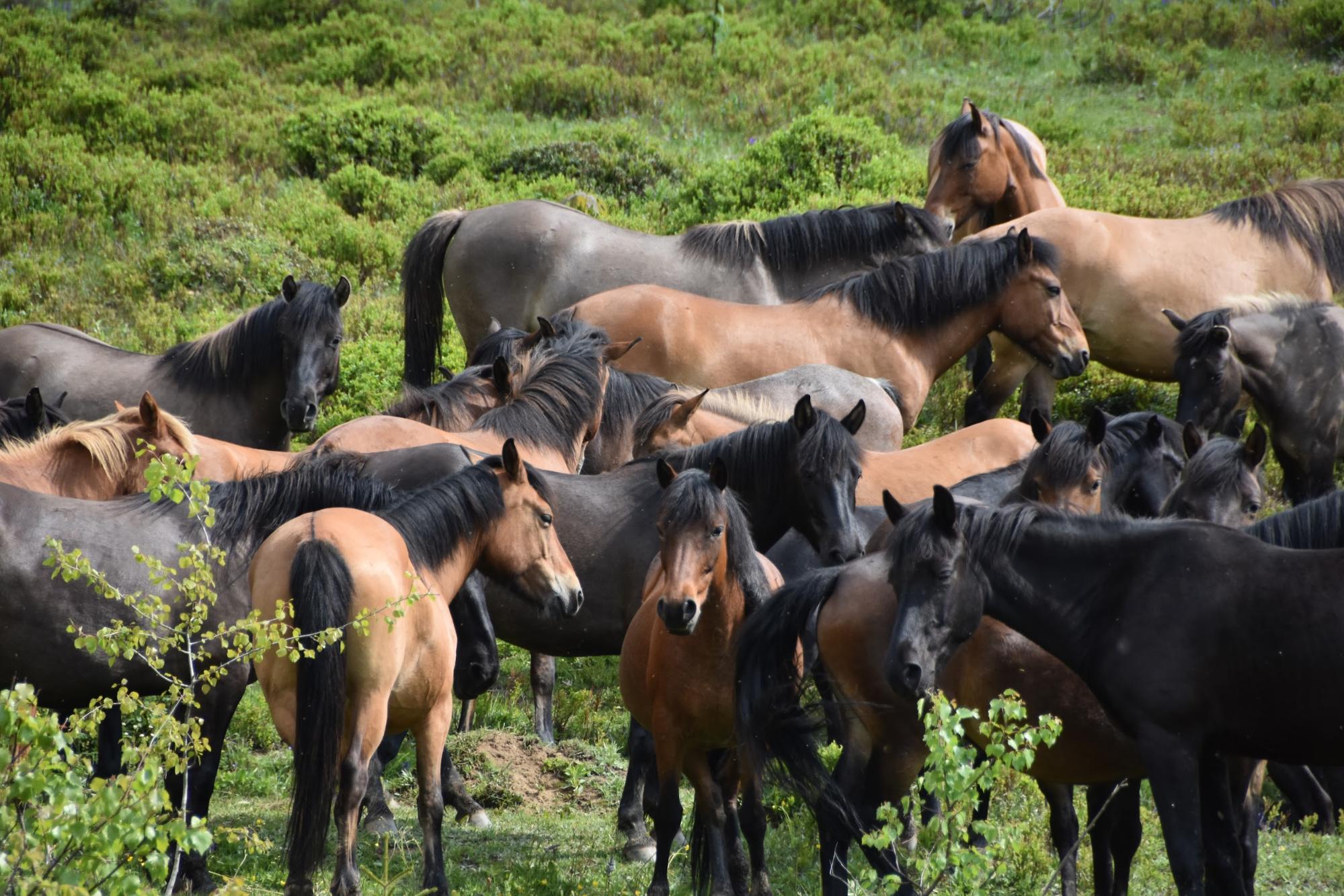
A herd of Hutsul horses on the pasture. Photo from the project's archive
One of the Horses and Heroes project's programs is "Rehabilitation of Active Military Personnel and Veterans through Contact with a Herd of Horses in the Mountains. Without Riding." It is based on an approach called equine partnership or equine interaction therapy. Unlike traditional hippotherapy, where the horse is used as a living tool without subjectivity, the horse and the person are equal partners in an equine partnership. This technique doesn't include close work with horses, avoiding the stress and anxiety that can come with it.
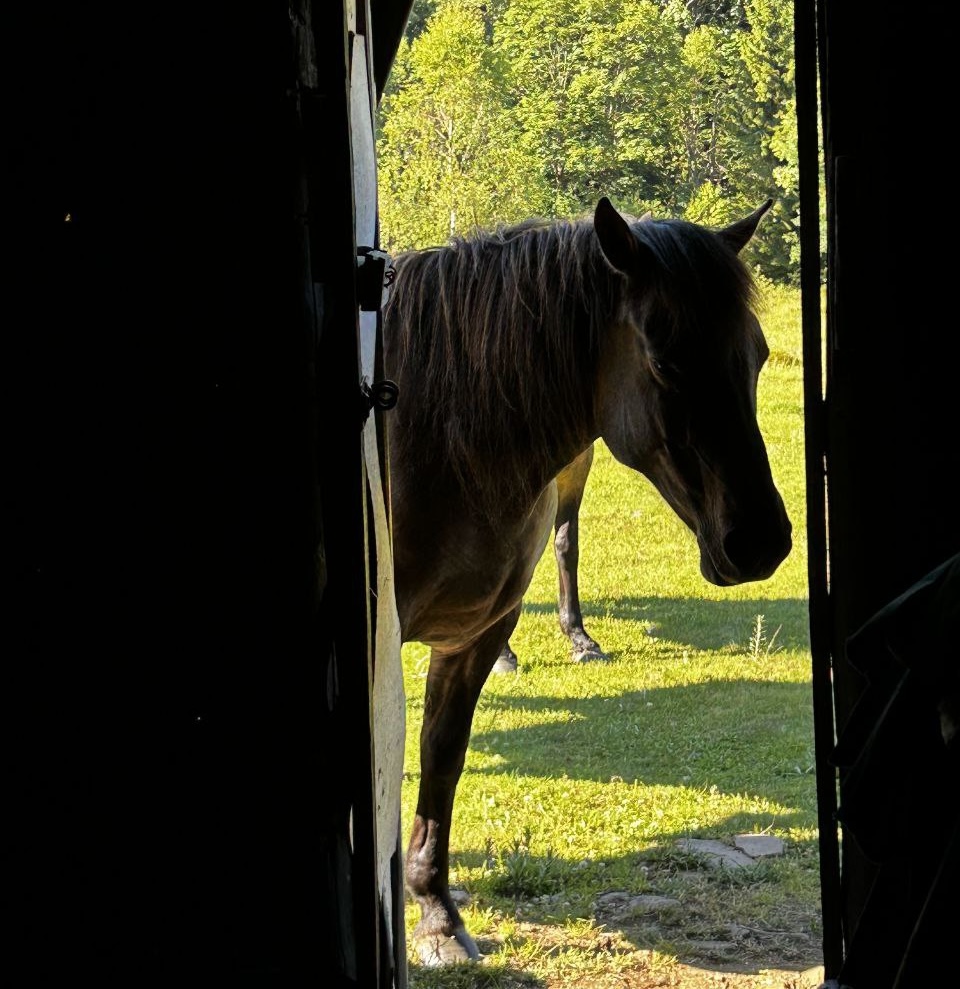
A horse peeks into the large tent where program participants live. Photo from the project's archive
The Horses and Heroes program is built on the coexistence between animals and humans, which, over time, transitions into cooperation. Oleksandr Ihnatenko compares this process to a game. Like any game, it has rules, and everyone must follow them to play fairly. The horses set the rules of the "game," or communication. The animals gently guide the rules, and as people follow these cues, they get deeper into the game, learn to be natural, feel more harmonious, and heal as a result.
"This system of cooperation isn't new to us; we always use it in our work with horses. Our 'civilized' society has changed our approaches to the 'game,' and some things that seem rational to us appear irrational in nature, and vice versa," says the project's co-founder.
Oleksandr adds that the program is based on restoring old approaches, where a rider had to work with horses, not from stable but free-ranging horses raised in a herd. This method is also used in "Horses and Heroes."
"We learn to communicate with horses in their language, not teaching them to understand ours," says the equine therapist. "This makes us understandable to the horses and allows us to receive feedback from them. This connection can help emotional healing and better relationships with friends and family."
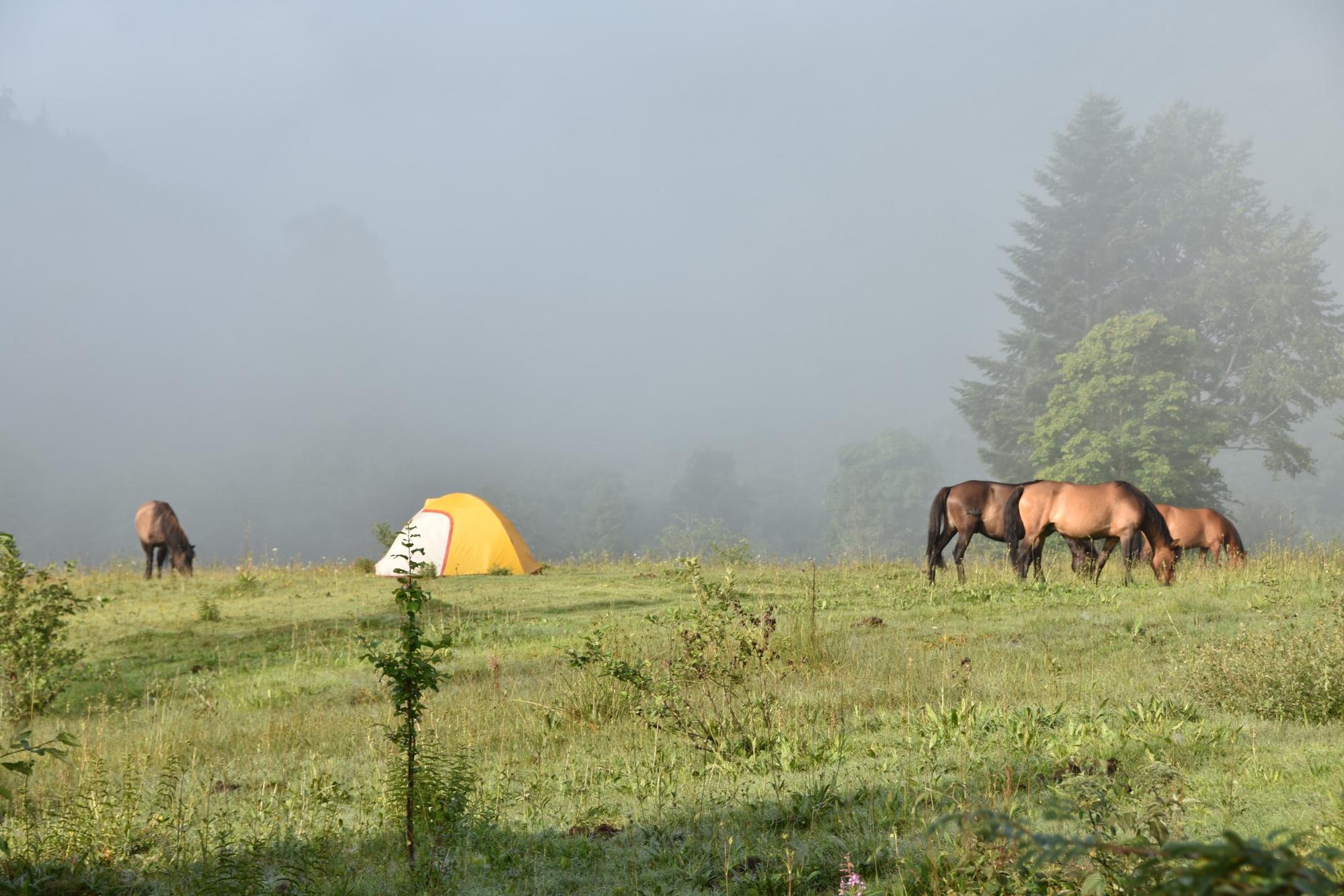
Living in a tent among the herd of Hutsul horses. Photo from the project's archive
In practice, the Horses and Heroes method means a week of living with the herd in their natural environment. Participants start with lectures to help them integrate into the herd without disturbing it. Then, they live among the Hutsul horses, with the natural sounds around them, observing the herd and interacting with people with similar experiences in a calm and pleasant camp atmosphere, free from constant information flow. The internet in the camp via Starlink is only available for 30 minutes a day to communicate with family.
The program creators note that after eight days in the mountains, participants will better understand and control themselves when facing painful memories and coping with real-life situations.
"We always noticed how positively the herd of horses affected our clients," says Yulia Komarova, the project's co-founder. "We repeatedly saw significant changes in people during our horse training and riding trips. After just a few sessions, people become more confident and calm."
Does it really work?
"Using the power of the herd and nature"
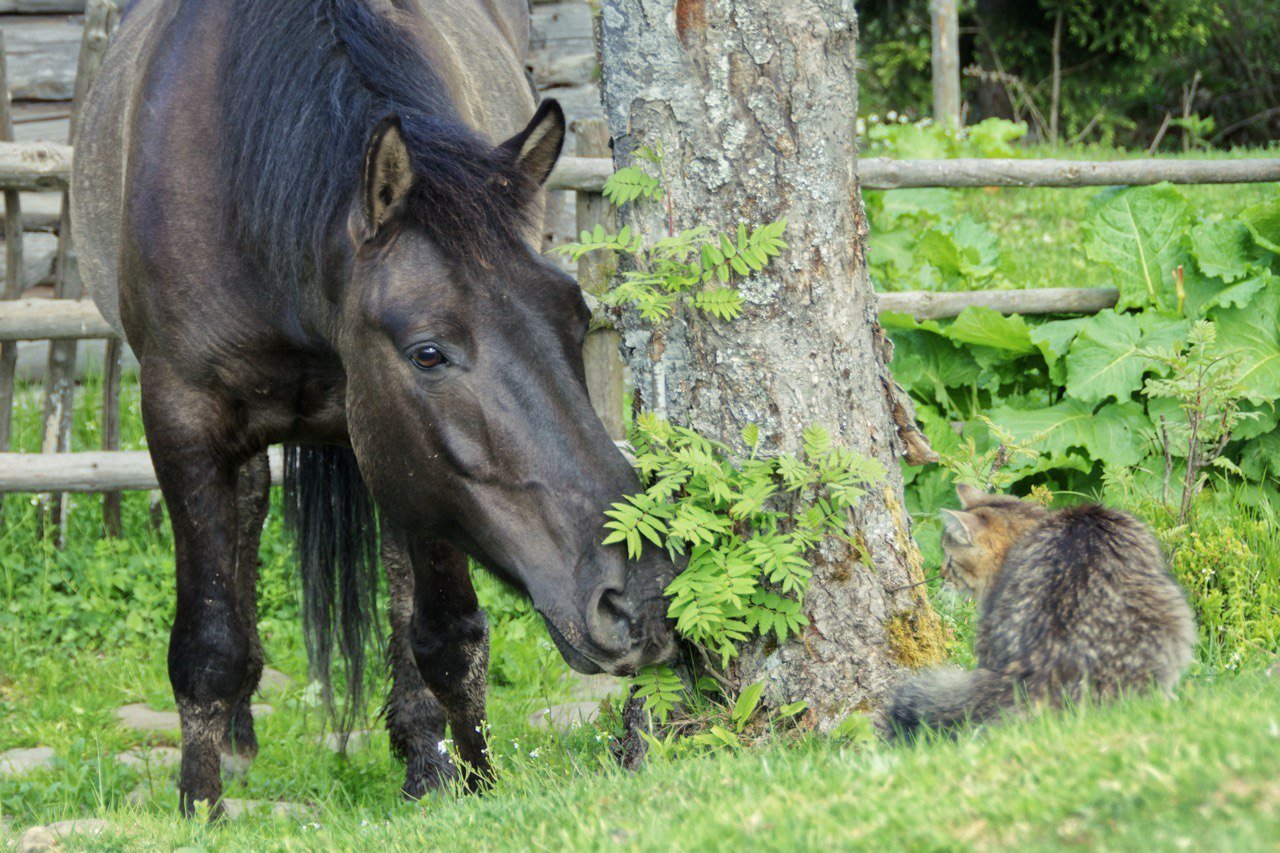
"The project team is two people, two cats, and 81 Hutsul horses," says Yulia Komarova, laughing. Photo from the project's archive
The Hutsul horse, or "Hutsulyk" for short, is a native breed from the Carpathian Mountains. They are called "smart horses." The project creators say that if you treat a Hutsulyk well, it will surely reciprocate with kindness and good work.
The first soldiers' visit to the horses took place in July. Oleksandr and Yulia prepared, raising the needed funding for one group of patients with the help of students from the Mountain Horse Tourism School and old friends from abroad. They also announced a fundraising campaign on social media. However, this idea quickly stalled as Ukrainians donated to other needs, and the initiative was fundraising for the first time.
"We wrote to many Ukrainian and foreign organizations and businesses, but we received very few responses, and almost all were negative," says Yulia Komarova. "The only company that responded and agreed to help was the French equestrian gear company FreeJump. They sent several items to their partners in Ukraine, and the proceeds from their sale went to the 'Horses and Heroes' program. We are very grateful for that."
After collecting the minimum amount of money needed for the first group, the partners started looking for participants, which also proved challenging. Many letters to veteran organizations did not help, even though they offered to recommend the program to potential participants.
Yulia continues, "Maybe our offer seemed strange, and it looked like we came out of nowhere, but Veteran Hub [a Ukrainian support center for soldiers] gave us excellent advice: to contact combat brigades directly. I think I wrote to all existing brigades. There were quite a few responses, but only three brigades signed up. Thanks to the lawyers from one of these brigades, we now have an agreement that allows soldiers to come to us not on leave but as part of a rehabilitation mission."
So, the first groups to visit the mountains were supposed to be from three combat brigades. However, the situation on the front line worsened, and the brigades had to temporarily withdraw from participation. Nevertheless, the debut of the Horses and Heroes program still took place.
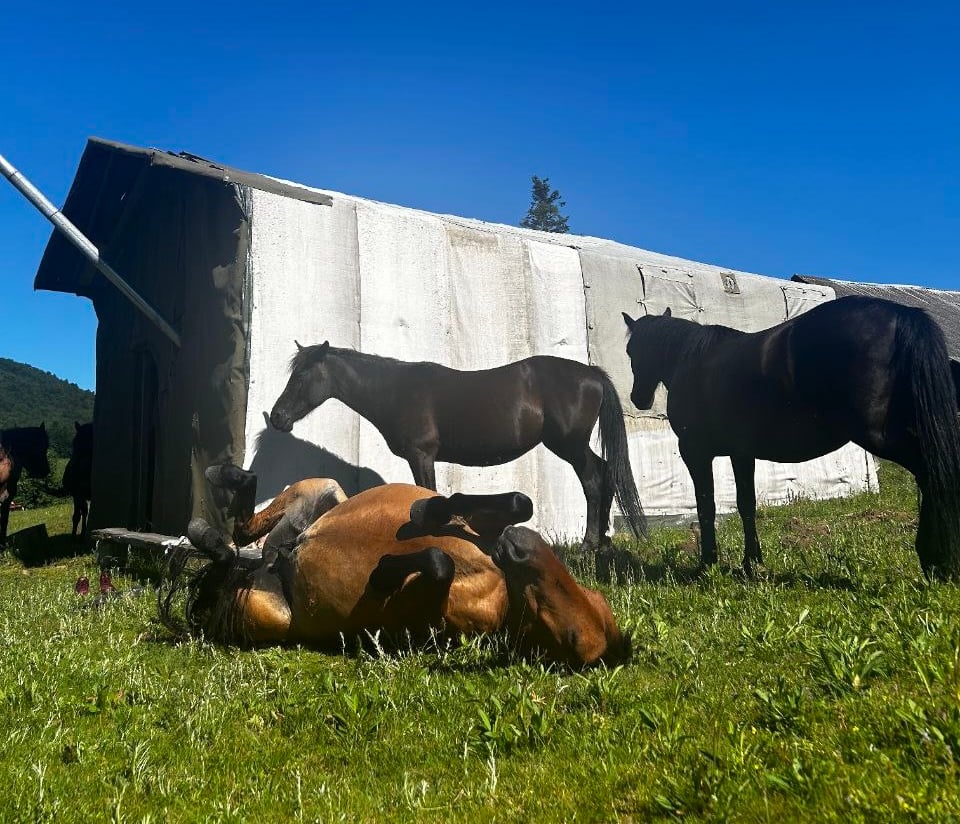
Horses playing near the large tent. Photo from the project's archive
"Everything went as we planned — after all, the program was developed over a long time based on real experience," says Yulia. "The only thing that didn't go as planned was the number of participants. We were ready to host 40 people, but only two could come. However, it was still crucial for us to complete the program for these two."
So, in the July session, two people — one active-duty soldier and one veteran — participated in the program. The founders of the Horses and Heroes project don't provide more details about the participants as the horse club follows the principle of confidentiality.
"Privacy is important; a person needs to know they can open up here. If you look at our Facebook and Instagram, you won't see the faces of our clients; we only share photos of the herd," says Oleksandr Ihnatenko.
However, Yulia Komarova shared with Rubryka some observations from the interaction between the horses and the military:
"Initially, the horses didn't understand what was expected of them or what this type of program was about. They would come to us in the morning, then wander off a bit, but we could always see them. Then, they would rest in the shade near us, groom each other, play, and show us how they interact. They would come to our table in the evening and start engaging with people. Participants learned to walk among the horses, observe their interactions, and understand which movements the horses didn't like."
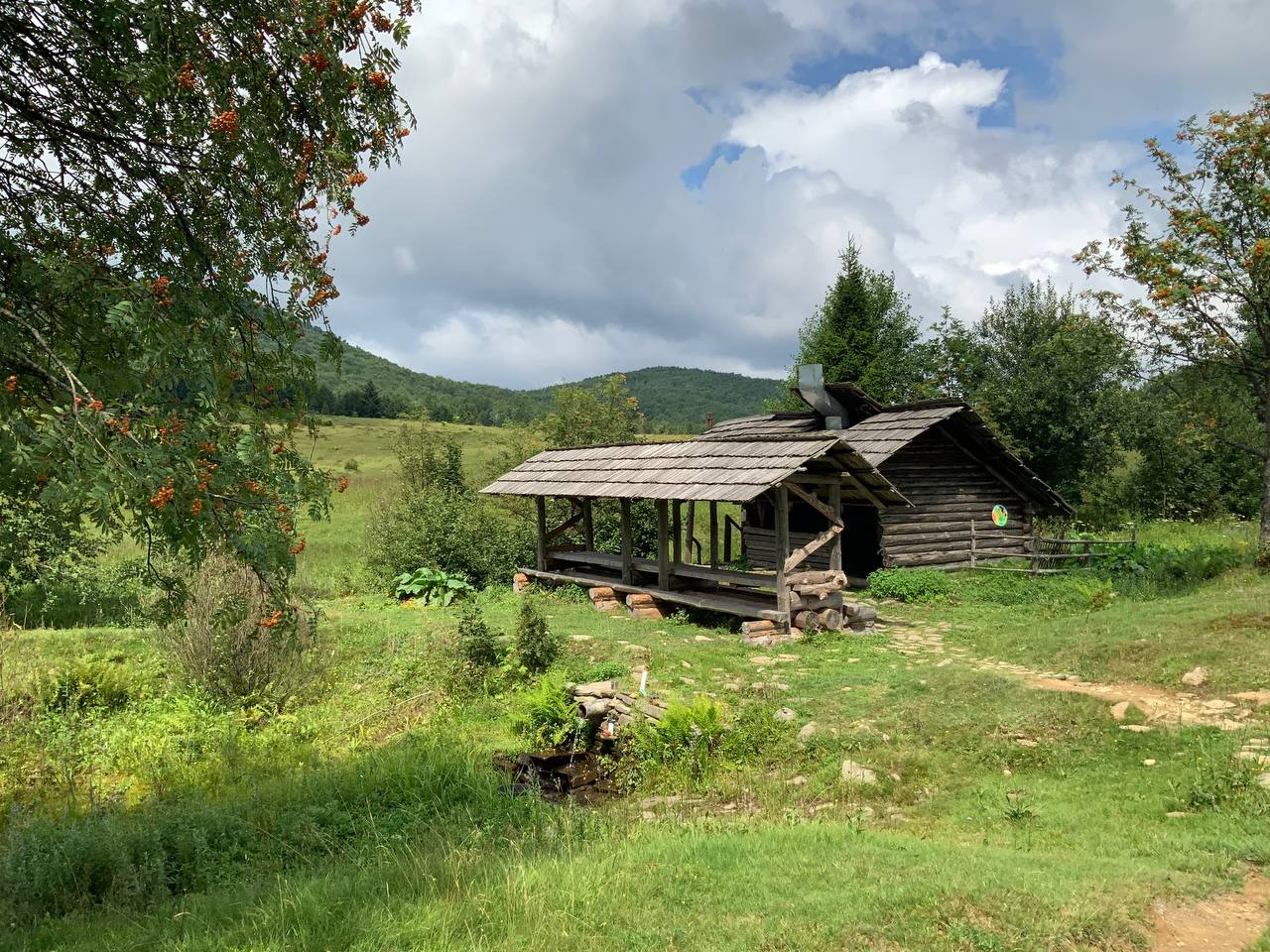
A log cabin with a large table at the horse club. Photo from the project's archive
Yulia also recalls a moment when the participants started observing a carpenter miller, an insect that feeds on wood, that had made a nest on a large wooden table in the camp's log cabin. She says this happened before soldiers met the horses, showing that the participants were already relaxed, open, and ready to observe. Meanwhile, the miller cleaned its nest and took its offspring for a walk. After cleaning, everything was carefully arranged back in place, a process that lasted about two hours.
"These are straightforward things, but the civilians we had before didn't perceive them with such interest, genuine joy, and satisfaction," says Yulia Komarova.
Even more helpful solutions!
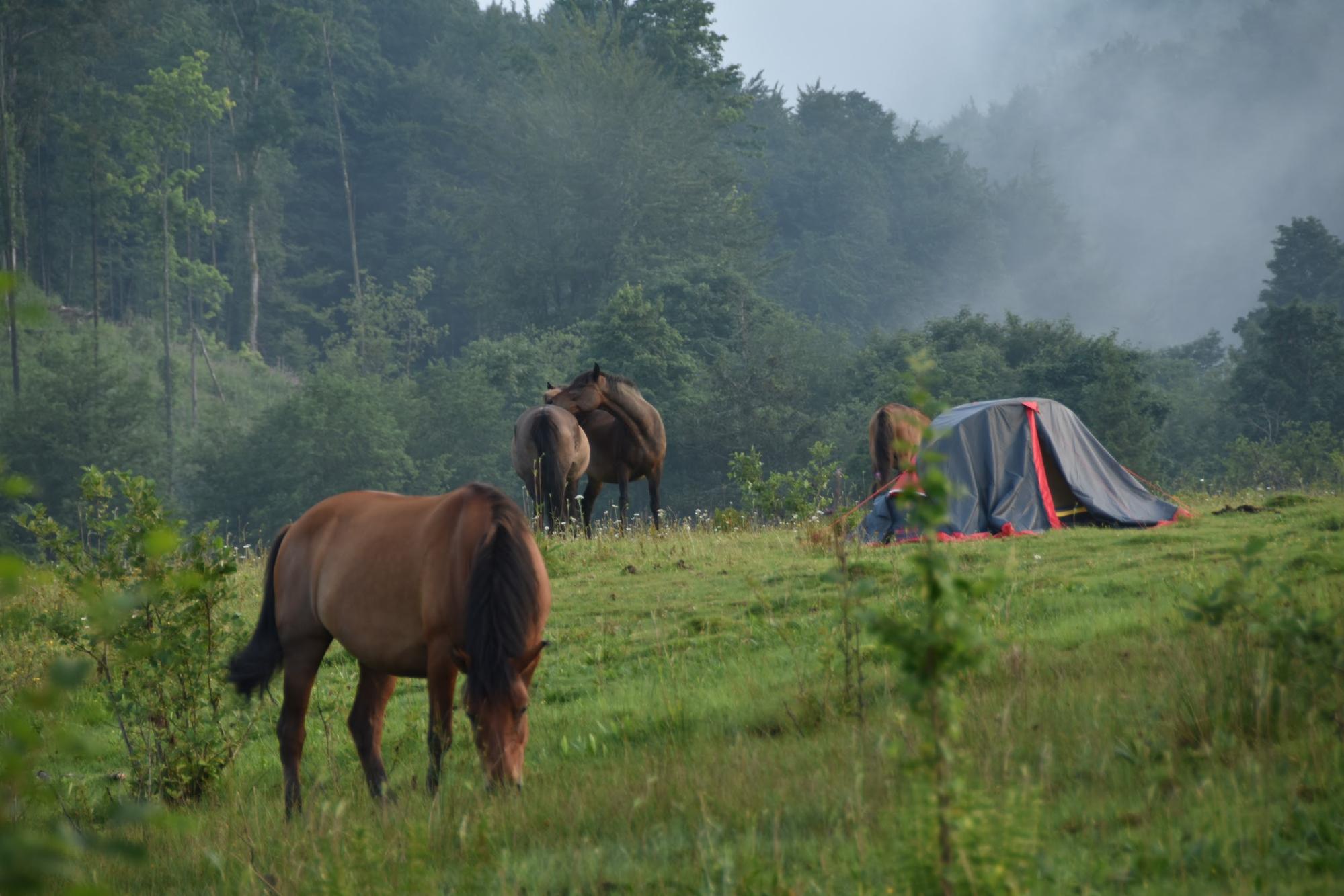
Horses grazing near the tent. Photo from the project's archive
The main takeaway from the first session for the project's founders was seeing the real impact of the program on the military and how interacting with the animals had a positive effect on the defenders. So Yulia and Oleksandr immediately scheduled the next camp session on September 7-14. They also expanded the program — now, every active-duty soldier or veteran gets a 100% discount to participate in the Horse Guests Camp with civilians, meaning they can relax with their family, friends, and children from age 10.
When writing this article, five people had already applied for the September session. Yulia Komarova hopes that the combat brigades with which the project has agreements will also be able to join.
"This is a chance to immerse oneself in this wonderful, lively place with happy horses for at least a short while, for eight days. Observe, listen, feel, and dive into oneself," says Yulia. "People are not robots; people are part of nature. Our horse herd is the pure energy of nature. Being among them is like spending a few days with a big happy family."
In the future, the co-founders also plan to develop a program that includes horseback riding.
During the season, the Horses and Heroes project can host a minimum of 40 participants and a maximum of 250 participants. If you are an active-duty soldier or veteran wanting to participate in the program, leave your application on the project's website.
You can also support the project with a donation and participate in the lottery. The main prize is a free ticket to the Horse Relax Tour "Horse Guests," which will take place from August 23 to 28. The conditions of the lottery can be found here.


